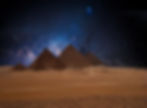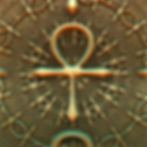Basics of Egyptian Astrology
- C. M. Ramsburg
- Jan 13, 2021
- 6 min read
Updated: Jul 15, 2022
Today we will learn the basics of Egyptian Astrology! The Egyptian Zodiac existed as early as 50 BCE. Our current knowledge of Egyptian Astrology derives from the Dendera Zodiac and the Cairo Calendar. Below we will delve into the origins of Egyptian Astrology and the signs that go with it!
Welcome to Ramstrology, the astrology blog written by Aries Ram, C. M. Ramsburg! Ramstrology delves into various Zodiac systems to highlight their diverse cultural influences. In this blog series, you'll learn the basic principles of astrology that are found in my YA Fantasy, SON OF THE SUN.

History of Egyptian Astrology

The Ancient Egyptians closely studied astronomy, the night sky playing a major cultural role in their society. For example, the Egyptians believed their Pharaohs became stars in the northern sky, aligning their pyramids to face the north. While the age of Egyptian Astrology is largely unknown, we know that the Egyptian Zodiac was around as early as 50 BCE. Our current knowledge of Egyptian Astrology derives from the Dendera Zodiac and the Cairo Calendar. The Egyptian Zodiac follows the standard 12-sign structure that is found in both Greek and Chinese Astrology. These signs are based on Egyptian gods and goddesses, influencing one's personality. Below you will find your Egyptian Zodiac Sign and its meaning!
What Egyptian Zodiac Sign are You?

The Egyptian Zodiac consists of 12 signs based on Egyptian gods and goddesses. Unlike the Greek Zodiac, the date ranges for each sign are split up throughout the year and vary greatly. While the date ranges are split, each sign rules over 30 days. Each date range is considered a separate "decan". Therefore, there are several decans under each sign. Each decan has a different ruling planet, making those born of the same sign vary by ruling planet if they fall under different decans. Below you will find your Egyptian Zodiac sign and its meaning!
Nile (January 1-7, June 19-28, September 1-7, November 18-26):
Those born of this sign are peaceful, passionate, and detail-oriented. They are known as great communicators. They are practical and cautious, avoiding conflicts and risks when possible. They are observant and analytical, which keeps them calm and safe.
Amun-Ra (January 8-21, February 1-11):
This sign is associated with leadership and power. Ra is the sun god and king of the Egyptian gods. Those born of this sign are optimistic and confident. They are often blessed with good fortune and success. They freely give advice, acting as guides for themselves and others.
Mut (January 22-31, September 8-22):
Those born of this sign are patient and nurturing. Mut means "mother of the world", making them great parents and educators. They have charming and generous personalities. They are often shy, hiding their knowledge and wisdom. They spend most of their time focusing on their dreams and goals with great determination.
Geb (February 12-29, August 20-31):
Geb is the Egyptian god of the earth and the father of the main gods. Those born of this sign are modest and proud. They value justice and diplomacy. They have charming personalities and they are loyal to others. They are reliable and grounded.
Osiris (March 1-10, November 27-December 18):
This sign is associated with having a dual personality, similar to Gemini in Western Astrology. They may be indecisive and independent. However, they are often energetic and charismatic. They are intelligent and trustworthy. However, they put themselves first and find it hard to work for others.
Isis (March 11-31, October 18-29, December 19-31):
Isis is the goddess of nature and wife to Osiris. Those born of this sign are often blunt and straightforward. They tend to be popular socialites with a great sense of humor. They are outspoken and give great advice. They are also passionate and ambitious, determined to complete their goals.
Thoth (April 1-19, November 8-17):
Thoth is the god of knowledge and wisdom, and those born of this sign share the same intelligence. They have great memories and communicate their thoughts effectively. They are patient and inventive, seeking knowledge wherever they go.
Horus (April 20-May 7, August 12-19):
Those born of this sign are courageous risk-takers. Their leadership abilities motivate and inspire others to follow them. They are selfless and work well in teams. They are hardworking, striving to better themselves. They often protect those who cannot protect themselves.
Anubis (May 8-27, June 29-July 13):
Anubis is the guardian of the underworld in Egyptian mythology. Those born of this sign are creative and introverted. Their emotions may be unpredictable and sensitive at times. They are curious and observant, often perceiving the emotions of others. They are also confident and respectable.
Seth (May 28-June 18, September 28-October 2):
Seth/Set is the Egyptian god of chaos. Those born of this sign are thrill-seeking and adventurous. They love to push themselves to go above and beyond, setting high goals for themselves. They enjoy freedom and being the center of attention.
Bastet (July 14-28, September 23-27, October 3-17):
Bastet is the goddess of cats and pleasure. Those born of this sign are intuitive and charming. They are loyal and loving in their relationships. They are emotional and affectionate, avoiding conflict and stressful situations. They are often secretive and mysterious.
Sekhmet (July 29-August 11, October 30-November 7):
Sekhmet is the Egyptian goddess of war. Those born of this sign are righteous and have a strong desire to uphold justice. They have unwavering discipline and a strong sense of duty, often being perfectionists. They are prideful and optimistic, enjoying power and leadership.
Egyptian Interpretations of the Zodiac Constellations

The Egyptians observed and recorded the same Zodiac constellations we view today. Egyptian Astrology and their constellations were deeply influenced by the Greeks. While the Egyptians shared a few of the same interpretations as the Greeks, some interpretations differed greatly. Below we will discuss the Zodiac constellations and their Egyptian interpretations!
Amommon (Aries)
The Aries constellation was originally interpreted by the Egyptians to be Thebes, an Egyptian goose deity. The Egyptians later interpreted the constellation to be a ram-like god that took care of the poor and pharaohs alike.
The Apis Bull (Taurus)
The Apis Bull was believed to be an oracle by the Ancient Egyptians. The Egyptians housed the bull in a temple surrounded by luxury. Once the bull died, its soul passed on to another bull who would take its place in the temple.
Horus the Elder and Younger (Gemini)
The Gemini constellation was interpreted as Horus, the son of Osiris and Isis, when he was both a young boy and when he was an elder. Horus is depicted as having the head of a falcon.
Scarab Beetle (Cancer)
The Cancer constellation was viewed as a scarab beetle, which is sacred to the Egyptians. The god, Khepri, had the form of a scarab beetle and was said to roll the sun across the sky, causing the sun to rise and set. The scarab beetle is associated with immortality.
Sphinx (Leo)
Many Ancient Egyptians viewed the Leo constellation as a Sphinx. Some viewed the constellation as a lion and associated it with droughts, as lions often came to the area to drink from the Nile when water was scarce.
Isis (Virgo)
The Virgo constellation was viewed as the Egyptian goddess, Isis. Isis was the wife of Osiris and goddess of fertility and nature. While the Greek and Egyptian interpretations of the Virgo constellation differ, the themes of femininity and fertility remain the same.
Scales of Truth (Libra)
The Libra constellation is viewed as scales in both the Greek and Egyptian interpretations; however, the mythology behind the scales differ. In Egyptian mythology, these scales were used by Anubis, the god of death, to weigh human souls against an ostrich feather representing truth. These scales were used for final judgement in the afterlife.
Scorpio (Scorpio)
The Scorpio constellation was viewed as a scorpion, as interpreted by the Greeks. The Scorpio constellation was believed to be one of the seven scorpions who protected Isis when she searched for Osiris.
Ibis Swan (Sagittarius)
The Sagittarius constellation was viewed as an Ibis Swan in the night sky. Thoth, the Egyptian god of wisdom, was depicted as having the head of an Ibis. This association made the Ibis sacred to the Egyptians.
Ibis-headed Man Riding a Sea-Goat (Capricorn)
While there is little known information about the Egyptian interpretation of the Capricorn constellation, we know they viewed it as an ibis-headed man riding a sea-goat. The man riding atop the sea-goat may have been the ibis-headed god, Thoth.
Knhum (Aquarius)
Knhum was known as the Water Carrier who assisted the god, Hapy, with flooding the Nile. The Ancient Egyptians believed that all water flowed from his pot. This story shares the same general concept as the Greek's Water Bearer.
The Fishes (Pisces)
The Egyptians viewed the Pisces constellation as two fish, nearly identical to the Greek's interpretation of the Zodiac constellation.
Son of the Sun, C. M. Ramsburg
“Oh yes, it is among the Cancer constellation. In Ancient Egypt, the constellation was perceived to be the sacred Scarab Beetle — not the Crab. The Egyptians believed the Scarab Beetle brought them immortality and resurrection.”
Fun Facts about the Author
C. M. Ramsburg taught herself Egyptian hieroglyphics in 4th grade. She can write fluently in hieroglyphics to this day. She also nearly missed her "Ancient Egyptian" final during her freshman year of college. She completed her 100-question final in 7 minutes and scored a 96% on it. She recommends Rick Riordan's THE KANE CHRONICLES for anyone who is interested in learning more about Egyptian mythology in an entertaining and fictional way.

"Thank you for reading" - written/drawn in Egyptian hieroglyphics by C. M. Ramsburg
Keep the Magic Alive by following C. M. Ramsburg on social media and subscribing to her author mailing list! Comment below if there's an astrology topic you'd like to read more about.







